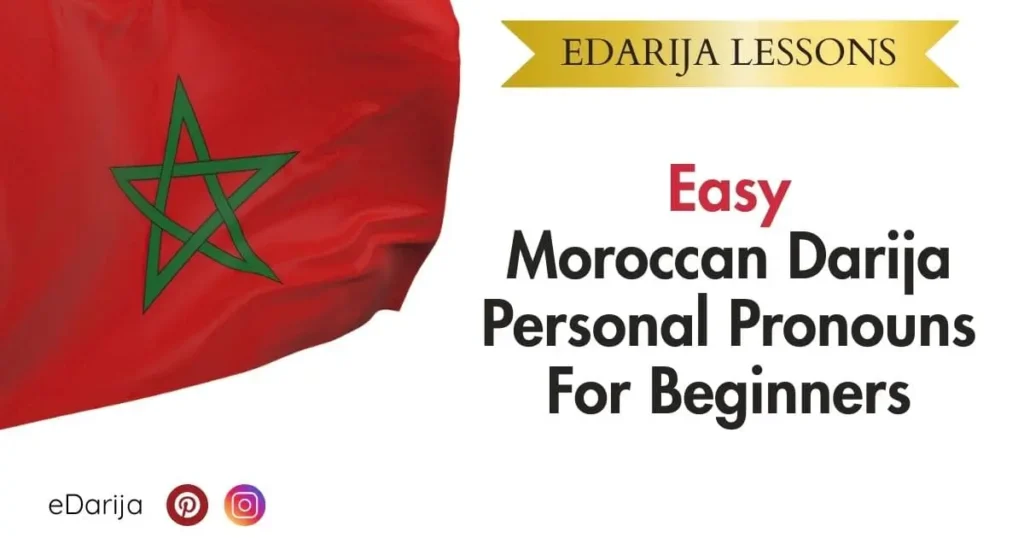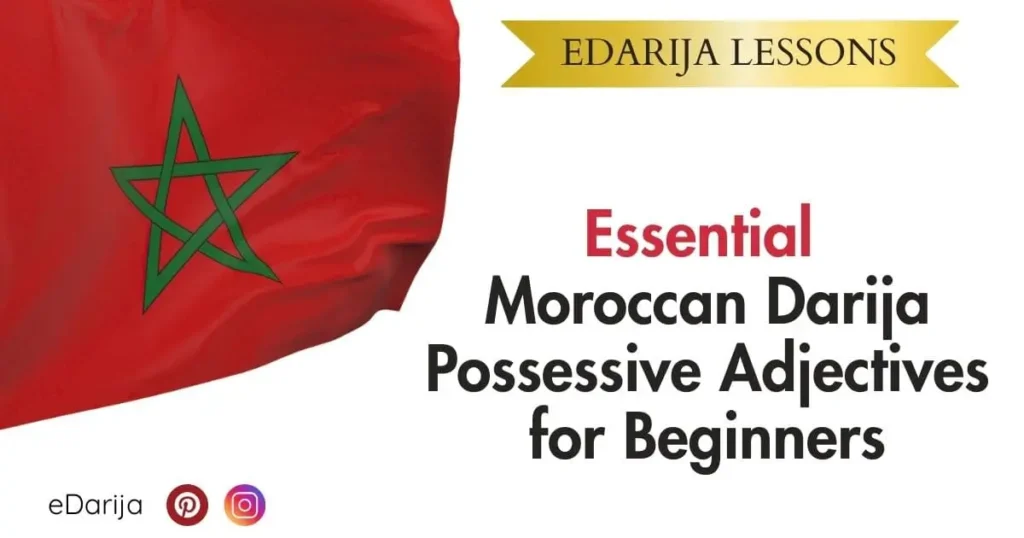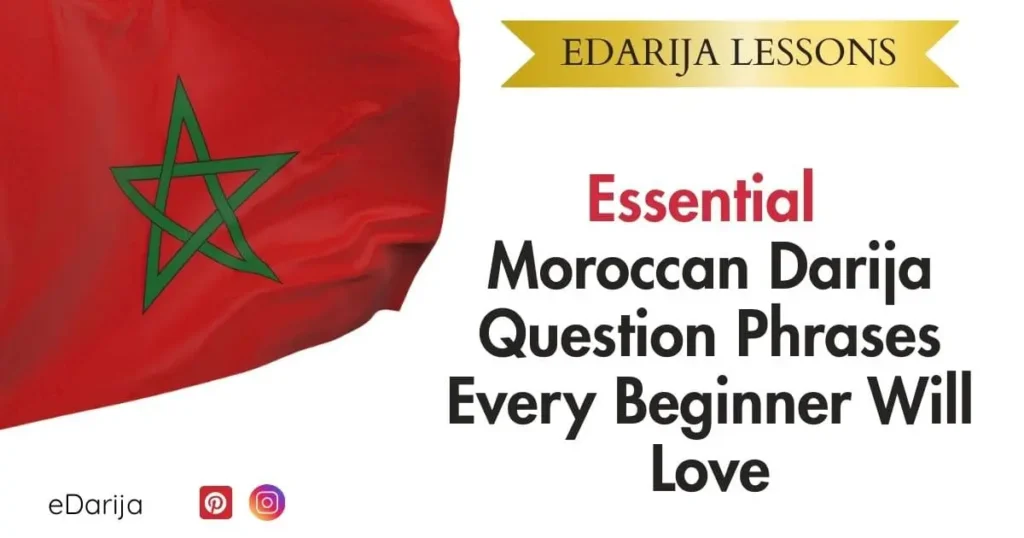
Politeness is a central part of Moroccan culture. Whether you are in a busy café in Casablanca, wandering the colorful streets of the souk in Marrakech, or visiting someone’s home in Fez, you will constantly encounter polite exchanges. Moroccans place a high value on showing respect through words, tone, and gestures. Knowing how to thank, apologize, respond to apologies, and ask for permission in Moroccan Darija will make your interactions smoother and more authentic.
In this lesson, we will explore key polite expressions in Moroccan Darija. You will learn the Arabic script, the Latin transcription, and the English meaning for each expression. By practicing these phrases in real-life contexts, you will improve your ability to connect with Moroccans respectfully and naturally.
By the end of this lesson, you will be able to:
- Express gratitude in Moroccan Darija.
- Apologize and respond to apologies appropriately.
- Ask for permission politely in different situations.
- Understand the cultural context behind these expressions.
1. How to Thank in Moroccan Darija
A. Core Phrases
- شكراً — Shukran → Thank you. The most common way to express thanks.
- بارك الله فيك — Barak Allah fik → May God bless you. Often used when someone does you a favor.
- ربي يخليك — Rebi ykhalik → May God preserve you. Used for close friends, family, or when someone helps you.
- شكراً بزاف — Shukran bzzaf → Thank you very much. A stronger expression of gratitude.
B. Intensifying Thanks
You can make your thanks more heartfelt by combining words:
- شكراً بزاف عليك — Shukran bzzaf 3lik → Thank you very much to you.
- بارك الله فيك بزاف — Barak Allah fik bzzaf → May God bless you greatly.
C. Everyday Use
Thanking is one of the most common polite expressions in Moroccan Darija. You can use these phrases in:
- Shops: After buying bread or vegetables, say Shukran bzzaf.
- Restaurants or cafés: When receiving tea or food, use Rebi ykhalik.
- Streets: When someone gives you directions or helps you with your bags, say Barak Allah fik.
D. Sample Dialogues
Example 1:
- A: ها القهوة، تفضل — Ha l’qahwa, tfadal (Here’s the coffee, welcome.)
- B: شكراً بزاف، بارك الله فيك! — Shukran bzzaf, barak Allah fik! (Thank you very much, may God bless you!)
Example 2:
- A: ها الكتاب ديالك — Ha l-ktab dyalk (Here’s your book.)
- B: ربي يخليك، شكراً بزاف — Rebi ykhalik, shukran bzzaf! (May God preserve you, thank you very much!)
Example 3 (market scenario):
- A: ها الخضرا — Ha l-khadra (Here’s the vegetables.)
- B: بارك الله فيك — Barak Allah fik (May God bless you.)
Using multiple real-life examples ensures learners can see how thank in Moroccan Darija works naturally.
Want to hear how these words are pronounced and learn even more vocabulary? Follow us on Instagram and Pinterest where we share daily Darija words, audio clips, and tips to boost your learning!
2. How to Apologize in Moroccan Darija
A. Core Apologies
- سمح لي — Smah li → Excuse me / Forgive me. Simple apology.
- أنا آسف — Ana asif → I’m sorry.
- غلطت — Ghlat → I was wrong.
- ما قصدتش — Ma 9sadtsh → I didn’t mean it.
B. Light Apologies
For minor incidents:
- سمح لي — Smah li lah ykhalik→ Sorry, just a little mistake (like bumping into someone).
- 3afak sma7 li — عفاك سمح لي → Please forgive me.
C. Deep or Serious Apologies
For bigger mistakes or misunderstandings:
- أنا كانعتادر بزاف — Ana kan3tader bzzaf → I deeply apologize.
- سمح ليا بزاف، كنت غلطان — Smah liya bzzaf, kont ghaltan → Please forgive me, I was wrong.
D. Sample Dialogues
Example 1 (money mistake):
- A: 3afak, sma7 li, 3titak l-flous ghalat عفاك، سمح لي، عطيتك الفلوس غلط (Sorry, I gave you the wrong money.)
- B: ما كاين مشكل، كاتوقع. Ma kayn mouchkil, katw9a3. (No problem, it happens.)
Example 2 (being late):
- A: سمح لي، تأخرت على الموعد. — Smah li, ta’akhrt 3la l-maw3id. (Sorry, I was late for the appointment.)
- B: ما عليهش، المهم وصلت دابا. — Ma 3lihch, l-muhim wsalt daba. (Don’t worry, the important thing is you arrived now.)
Example 3 (accidental bump in the street):
- A: سمح لي، ما شفتكش. — Smah li, ma shftaksh. (Sorry, I didn’t see you.)
- B: ما كاين باس. — Ma kayn bass. (It’s fine.)
By expanding dialogues, learners can see different ways to apologize in Moroccan Darija.
3. Responding to Apologies
When someone apologizes, Moroccans usually respond in a friendly, non-confrontational way:
A. Core Responses
- ما كاين مشكل — Ma kayn mouchkil → No problem.
- كاتوقع — Katw9a3 → It happens.
- ما عليهش — Ma 3lihch → Don’t worry.
- الله يسامح — Allah ysam7 → May God forgive.
B. Formal vs. Informal Responses
- Formal / strangers: ما كاين باس — Ma kayn bass → It’s okay.
- Informal / friends: صافي، نسيت — Safi, nssit → It’s okay, I forgot.
C. Sample Dialogue
Example 1:
- A: سمح لي، تأخرت على القسم. — Smah li, ta’akhrt 3la l9ism. (Sorry, I was late to class.)
- B: ما كاين مشكل، بديت غير دابا. — Ma kayn mouchkil, bdit ghir daba. (No problem, I just started now.)
Example 2:
- A: أنا آسف على الإزعاج. — Ana asif 3la l-iz3aj. (I’m sorry for disturbing you.)
- B: ما عليهش، ماشي مشكل. — Ma 3lihch, mashi mouchkil. (Don’t worry, it’s not a problem.)
4. Asking for Permission in Moroccan Darija
A. Key Phrases
- نقدر…؟ — N9dr…? → Can I…?
- يمكن…؟ — Yemkin…? → Is it possible…?
- واش يمكن ليا…؟ — Wash yimkin liya…? → Can I…?
- عفاك، نقدر ن…؟ — afak, n9dr n…? → Please, may I…?
B. Everyday Scenarios
- نقدر ندخل؟ — N9dr ndkhl? → Can I come in?
- واش يمكن نستعمل التليفون؟ — Wash yimkin nsta3ml tilifon? → Can I use the phone?
- نقدر نسول على…؟ — N9dr nssawl 3la…? → Can I ask about…?
C. Polite Requests
Adding 3afak makes requests softer:
- 3afak, ila makanch mouchkil… → عفاك، إلا ما كانش مشكل… — Please, if it’s not a problem…
- واش ممكن تعطيني…؟ — Wash mumkin ta3tini…? → Could you give me…?
D. Sample Dialogue
Example 1:
- A: واش نقدر نقرا الكتاب ديالك؟ — Wash nqdr n9ra lktab dyalk? (Can I read your book?)
- B: معلوم , خودو — Ma3loum, khodo. (Sure, take it.)
Example 2:
- A: عفاك، نقدر نفتح الشرجم؟ — afak, n9dr nftah sharjem? (Please, can I open the window?)
- B: اه ، معلوم — ah, ma3loum. (Yes, of course.)
5. Cultural Notes
- Politeness in Moroccan Darija often includes blessing formulas like Barak Allah fik.
- Apologies are paired with body language, such as a humble tone or hand on chest.
- People often downplay mistakes, so replies like Ma kayn mouchkil are very common.
- Using 3afak shows respect and softens requests.
- Casual situations among friends allow shorter, informal expressions.
6. Practice Exercises
A. Fill in the Blank
- ………………. (Thank you very much!)
- ………………………….. (Sorry, I didn’t mean it.)
- واش ……………… ندخل؟ (Can I come in?)
B. Match the Phrase with the Situation
- Shukran bzzaf → Someone gives you directions.
- Smah li → You bump into someone accidentally.
- Ma kayn mouchkil → A friend apologizes for being late.
- 3afak, n9dr n…? → Asking for permission politely.
C. Role-play Task
Practice a dialogue where you:
- Thank someone for offering tea.
- Apologize for arriving late.
- Respond to the apology.
- Ask politely for permission to borrow something.
- Include a small cultural gesture (e.g., hand on chest, soft tone).
Conclusion
Mastering polite expressions is essential for sounding natural in Moroccan Darija. You now know how to thank in Moroccan Darija, apologize and respond, and ask for permission politely.
Using these phrases in cafés, markets, or with Moroccan friends will help you build trust, show respect, and create smoother interactions. Remember that gestures, tone, and context are just as important as the words.
For more practice, explore lessons on Moroccan Darija greetings and essential question phrases for beginners.
FAQs for “Polite Expressions in Moroccan Darija”
What are the most common ways to thank in Moroccan Darija?
The most common ways include:
شكراً — Shukran → Thank you
بارك الله فيك — Barak Allah fik → May God bless you
الله يخليك — Allah ykhlik → May God preserve you
شكراً بزاف — Shukran bzzaf → Thank you very much
These expressions are used in everyday situations like cafés, markets, and homes.
How do I apologize in Moroccan Darija politely?
You can use phrases like:
سمح لي — Smah li → Excuse me / Forgive me
أنا آسف — Ana asif → I’m sorry
أنا كانعتادر بزاف — Ana kan3tader bzzaf → I deeply apologize
Adding gestures like placing your hand on your chest or using a soft tone makes the apology more respectful.
How can I respond to apologies in Moroccan Darija?
Typical replies include:
ما كاين مشكل — Ma kayn mouchkil → No problem
كاتوقع — Katw9a3 → It happens
ما عليهش — Ma 3lihch → Don’t worry
These phrases help maintain politeness and prevent awkwardness in social interactions.
How do I ask for permission politely in Moroccan Darija?
You can use:
نقدر…؟ — N9der…? → Can I…?
واش يمكن ليا…؟ — Wash yimkin liya…? → Can I…?
عفاك، نقدر ن…؟ — afak, n9der n…? → Please, may I…?
Adding 3afak (please) makes your request softer and more polite. Example: 3afak, nqdr ndkhl? → Please, can I come in?




Pingback: 10 Popular Darija Phrases to Impress Your Moroccan In-Laws
Pingback: How To Negotiate Prices in Morocco Like a Local